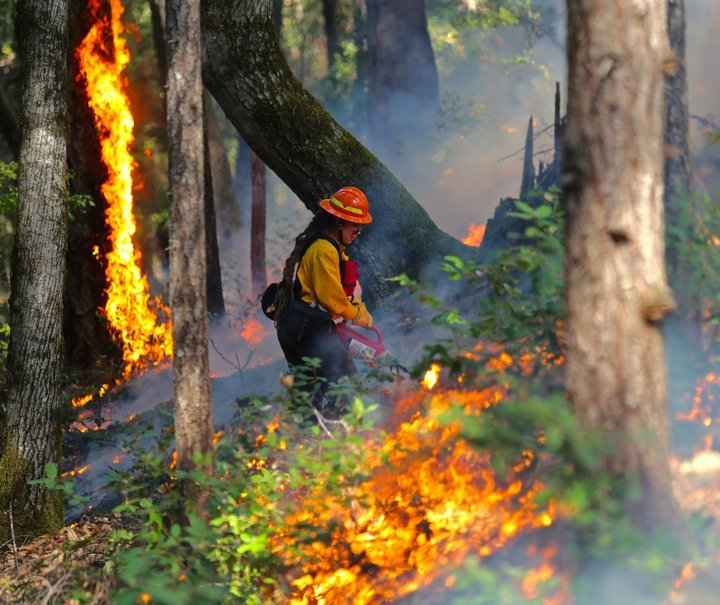
A participant in a 2017 prescribed fire training exchange (TREX) spreads flame to the underbrush during a collaborative effort between the Karuk Tribe and the Mid-Klamath Watershed Council. | Photos by Andrew Goff.
###
Press release from the California Cattlemen’s Association, the Karuk Tribe and Defenders of Wildlife:
Today a diverse coalition representing tribes, ranchers and conservationists announced strong support of Senate Bill (SB) 332, state legislation that would enable more cultural and prescribed burns. Tribes like the Karuk want to use prescribed fire to protect homes and restore watersheds, much like their ancestors did, and farmers, ranchers and conservationists use fire to manage noxious weeds, restore wildlife habitat and protect biodiversity. In many cases the legal and policy barriers for all of these groups are the same.
According to the bill’s author, Senator Bill Dodd (D-Napa), “California has to work harder to protect our communities from catastrophic wildfire. I’m proud to work with Tribes, conservation groups and ranchers to help our local communities play a larger role in fire management.”
For over 100 years fire suppression policies have led to a dangerous build-up of brush and unhealthy trees. Climate change and increased rural development have dramatically increased the risk of catastrophic wildfires in recent years. In order to incentivize the use of prescribed and cultural burning to fight dangerous wildfires, groups say California must reform its liability laws.
“Prescribed fire is an essential tool for ranchers managing rangelands and controlling invasive weeds, not to mention the part it plays in helping mitigate wildfire,” explains Tony Toso, Mariposa County cattle rancher and California Cattlemen’s Association President. “Currently, it’s nearly impossible to find someone willing to take on the personal liability risks associated with a burn project.”
According to Karuk Natural Resources Director and traditional fire practitioner Bill Tripp, “My ancestors practiced cultural burning for millennia along the Klamath and Salmon Rivers. Low intensity burns at the right time of year reduce wildfire risks in our communities and promote forest health. We must enact policies to enable and encourage rural communities to do this important work.”
“Ramping up the pace and scale of prescribed burning is an important way to fight fire with fire,” said Pamela Flick, California program director for Defenders of Wildlife. “These efforts will succeed only if property owners have better liability protections in order to participate at a meaningful scale. We thank Senator Dodd for leading on this issue and addressing California’s wildfire resiliency in the face of a changing climate and increased fire risk.”
California is currently rolling out its new State-Certified Burn Boss Program, which will certify highly experienced practitioners to plan and lead prescribed burns. Though more rigorous than most other states’ programs, the California certification does not provide the same level of liability relief that other states do. This means California Burn Bosses risk personal liability for damages even when meeting all legal and permit requirements of a project, while their federal and state counterparts enjoy indemnification from their agencies for the same work.
In other words, highly qualified individuals will not be interested in gaining certification unless California can offer better liability protections.
“You can’t expect an individual to take on prescribed fire projects unless they have liability protections. California is simply behind the times when it comes to providing incentives to communities to protect their homes and restore their watersheds,” explains Lenya Quinn-Davidson, Director of the Northern California Prescribed Fire Council.
Currently, SB 332 enjoys support from over 60 organizations from around the state representing a wide range of interests. Opponents include insurance and trial lawyers who financially benefit from the status quo.
CLICK TO MANAGE